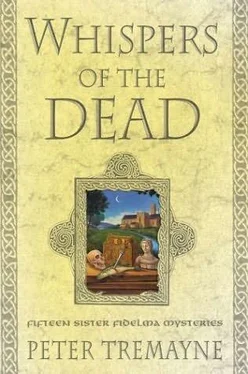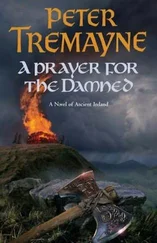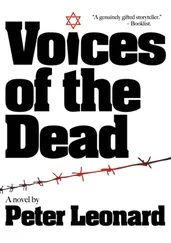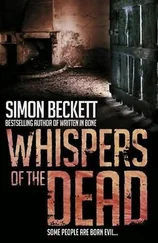Peter Tremayne - Whispers of the Dead
Здесь есть возможность читать онлайн «Peter Tremayne - Whispers of the Dead» весь текст электронной книги совершенно бесплатно (целиком полную версию без сокращений). В некоторых случаях можно слушать аудио, скачать через торрент в формате fb2 и присутствует краткое содержание. Жанр: Исторический детектив, на английском языке. Описание произведения, (предисловие) а так же отзывы посетителей доступны на портале библиотеки ЛибКат.
- Название:Whispers of the Dead
- Автор:
- Жанр:
- Год:неизвестен
- ISBN:нет данных
- Рейтинг книги:4 / 5. Голосов: 1
-
Избранное:Добавить в избранное
- Отзывы:
-
Ваша оценка:
- 80
- 1
- 2
- 3
- 4
- 5
Whispers of the Dead: краткое содержание, описание и аннотация
Предлагаем к чтению аннотацию, описание, краткое содержание или предисловие (зависит от того, что написал сам автор книги «Whispers of the Dead»). Если вы не нашли необходимую информацию о книге — напишите в комментариях, мы постараемся отыскать её.
Whispers of the Dead — читать онлайн бесплатно полную книгу (весь текст) целиком
Ниже представлен текст книги, разбитый по страницам. Система сохранения места последней прочитанной страницы, позволяет с удобством читать онлайн бесплатно книгу «Whispers of the Dead», без необходимости каждый раз заново искать на чём Вы остановились. Поставьте закладку, и сможете в любой момент перейти на страницу, на которой закончили чтение.
Интервал:
Закладка:
Fidelma considered the question before answering. She did not like to give glib answers for the sake of politeness.
“The great Fair of Carman is an experience not to be missed,” she replied with studied reflection.
The Aenach, or Fair of Carman, was held once every three years over the days of the Feast of Lugnasadh, the first days of what the Romans called the month of Augustus, and it was one of the two major fairs held within the kingdom of Laighin. It was attended in person by Fáelán of the Uí Dúnláinge, King of Laighin, and no less than forty-seven of his leading nobles. During the period of the fair, there were games, contests in sports and the arts. Poets would declaim their verses and strong men would contest with one another in all manner of feats of skill as well as strength. So would women, because there were special times set aside for contests between women. In addition to the entertainment, there were markets for all manner of livestock, produce and goods.
In fact, Laisran had been telling Fidelma how he had to chase a stall keeper from the fairground because the man had been selling potions for destroying pests such as foxes and wolves. But the very noxious brews that would kill a fox or a wolf could kill other animals and, as such, were prohibited from sale at the Fair. Yet it was true that many wonderful and curious things were to be found on sale in the stalls of the Aenach Carman.
But there was also a serious side to the Aenach Carman, unlike the Aenach Lifé, which was Laighin’s other great fair and devoted to horse racing.
During the days of the Aenach Carman, the assembly of the kingdom met. All the nobles, the chiefs of clans, the Brehons and lawyers, the professional men and women gathered to discuss the laws. On the first day, the men and women of the kingdom held separate councils at which the other sex was not allowed to enter. The women’s council admitted no man and the men’s council admitted no woman. Each council met and decided matters pertaining to their sex and elected representatives to go forward to attend the formal meetings of the Great Assembly of Laighin. Both sexes attended this and matters pertaining to all the people were discussed and decided upon. The King, his Brehons, or judges, and representatives of all the people would discuss any necessary amendment to the laws and agree on the fiscal policies of the kingdom for the next three years.
While Fidelma was from the neighboring kingdom of Muman, and therefore not qualified to voice any opinion in the councils nor Assembly, she had been invited by the women’s council to attend and speak to them as their guest. She was asked to advise them on certain laws in her own kingdom and how they might be applicable to Laighin. For while the great law system applied equally in all five kingdoms, there was a section of laws called the Urrdas Law, which were the minor variations that applied from kingdom to kingdom. But now such serious matters were over and one more day of festivity would end the fair.
Fidelma had been delighted, although not surprised, to find her distant cousin and friend, Laisran, Abbot of Durrow, the great teaching college, attending the fair. Not only attending it, but being present as advisor to the Great Assembly. It had been Laisran who had persuaded her to join the nearby Abbey of Brigid at the Church of the Oaks, not far from the plain by the river Bearbha on which the Aenach Carman was held. But Fidelma had long since left the Abbey of Brigid to return to her own land.
“What did you think of the competence of our law-makers?” Laisran was asking. “Do we pass good laws and have good government?”
Fidelma chuckled.
“Did not Aristotle say that good laws, if they are not obeyed, do not constitute good government?”
Laisran answered his young cousin’s infectious humor.
“I might have expected that from a lawyer,” he said. “Seriously, have you enjoyed the Aenach Carman?”
Fidelma agreed but added: “Although I have often wondered why it is so called. Wasn’t Carman a malevolent female figure who had three sons, and didn’t they blight all the crops in Éireann until the children of Danu defeated them and drove them into exile? How, then, does it come about that the people of Laighin do honor to her by naming their principal festival after her?”
Laisran’s eyes had a twinkle.
“Well, if I were to tell you. .”
“My lord!”
A man who came running toward them cut the abbot’s words short. He was well dressed and wore a chain of office.
“Lígach, chieftain of the Laisig,” whispered Laisran in quick explanation. “The Laisig are the hereditary organizers and stewards of the fair.”
The man halted somewhat breathlessly before the abbot. He was clearly disturbed about something.
“My Lord Abbot. .,” he began, and then had to pause to gulp some air.
“Calm yourself Lígach. Catch your breath and then state calmly the matter that is troubling you.”
The chieftain paused and took several breaths.
“We need your services. Ruisín is dead. I have sent for an apothecary but we cannot find one on the field. I know you are not without some medical skills, Lord Abbot.”
“Ruisín dead? How did he die?”
“Ruisín?” intervened Fidelma, interested by Laisran’s concern. “Who is he?”
Laisran replied immediately.
“He is. . he was,” he corrected, “a champion of the Osraige.” He turned back to Lígach. “What has happened? An accident?”
Lígach shook his head.
“We think a surfeit of alcohol has killed him.”
Fidelma raised an eyebrow in query. Lígach saw the look and answered.
“He was taking part in a challenge. Crónán, the champion of the Fidh Gabhla, had challenged him as to how much ale each of them could consume. Suddenly, with no more than the first jug taken, Ruisín collapsed, and was carried to his tent, but when we laid him down we found his pulse no longer beat.”
“A drinking contest?” Fidelma’s features twisted into a grimace of disapproval. Drink in moderation, wine with a meal, there was nothing better. But to drink to destroy the senses was pathetic, something she could never understand.
Lígach was defensive.
“There are often such contests between the champions of the clans. A clan can lose all honor if their champion fails.”
She sniffed in distaste.
“Far be it for me to condemn anyone when a man lies dead, but my mentor, the Brehon Morann, always said that alcohol is lead in the morning, silver at noon, and gold at night and lead always follows the period of gold. So excessive drinking is merely a pursuit of fool’s gold.”
“Please, my lord,” urged Lígach, ignoring her, “come, confirm his death and perform the last rite of the Faith. Ruisín’s wife Muirgel is with the body and is in distress.”
“Lead me to his tent, then,” Laisran said, and then glancing at Fidelma, “Perhaps you would like to accompany me, Fidelma? You might be able to formulate some words to the widow for I feel myself inadequate to utter comfort in such circumstances.”
Reluctantly, Fidelma fell in step with the abbot. She, too, could not think what might be said to comfort someone who drank him or herself into an early grave for the sake of a wager. They followed the nervous chieftain to the area of the field where the tents of those participating in the fair were raised. A small group stood outside one tent, which marked it off as the one in which Ruisín’s body had been laid. The group of men and women parted before them.
Lígach went in before them.
Inside, a woman was kneeling beside the body of a man. She was young and fairly attractive. She glanced up as they entered. Fidelma noticed that her face wore an almost bland expression. The eyes were large and round and dry. There was no discernible grief in the face, not the tearful lines of one struck by sudden grief.
Читать дальшеИнтервал:
Закладка:
Похожие книги на «Whispers of the Dead»
Представляем Вашему вниманию похожие книги на «Whispers of the Dead» списком для выбора. Мы отобрали схожую по названию и смыслу литературу в надежде предоставить читателям больше вариантов отыскать новые, интересные, ещё непрочитанные произведения.
Обсуждение, отзывы о книге «Whispers of the Dead» и просто собственные мнения читателей. Оставьте ваши комментарии, напишите, что Вы думаете о произведении, его смысле или главных героях. Укажите что конкретно понравилось, а что нет, и почему Вы так считаете.












